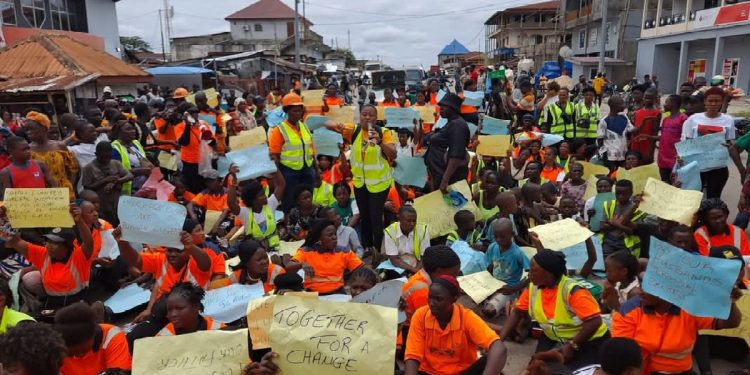By Hassan Osman Kargbo
In a powerful show of solidarity and desperation, the wives of over 900 dismissed workers of Koidu Limited took to the streets of Koidu City on Sunday 18 May 2025, demanding justice, reinstatement of contracts, and the immediate payment of outstanding benefits owed to their husbands.
The protest marks a new phase in the ongoing industrial unrest that has gripped the region for several days. The striking workers, formerly employed by the diamond mining company, have been staging demonstrations since their abrupt termination, alleging unfair dismissal and non-payment of severance and other entitlements.
Chanting slogans and holding up placards, the protesting women marched through the city centre, stopping at key government offices and the local Koidu Limited premises. Many wore worn-out uniforms of their husbands’ former employer as a symbol of the families’ direct connection to the company—and the hardship now faced.
“We are tired of being ignored,” said Mariama Koroma, one of the protesters and mother of four. “Our husbands worked day and night in those dangerous mines. Now they’ve been thrown out like garbage, and no one is helping us. Our children are starving. We cannot pay school fees, we cannot buy food.”
The women appealed to the government, traditional leaders, and international stakeholders to intervene in what they described as a humanitarian crisis. Several of the placards read, “Bring Back Our Husbands’ Jobs,” “No Food, No Future,” and “Koidu Limited, Pay What You Owe.”
The strike began after Koidu Limited, one of Sierra Leone’s largest diamond mining companies, terminated the contracts of over 900 workers. According to the affected workers, the company provided no adequate explanation or compensation. Many believe the dismissals were aimed at silencing complaints over poor working conditions and wage issues.
“We were told it was restructuring,” said Mohamed Sesay, one of the dismissed miners, in a separate interview. “But what kind of restructuring sends nearly a thousand people home with nothing? We have families. We gave our strength to that mine.”
So far, Koidu Limited has not issued a formal response to the growing unrest. Attempts to contact company representatives for comment were unsuccessful. Meanwhile, the Ministry of Labour has acknowledged the strike and said it is “reviewing the matter,” though no official timeline has been provided for intervention.
Local leaders have begun mediating behind the scenes, but tensions remain high. The protest by the women is widely seen as an emotional turning point—amplifying public sympathy and drawing attention to the broader social consequences of the layoffs.
Human rights groups and civil society organizations have also started voicing concern. “This situation is spiralling,” warned Amadu Bangura, a labour rights activist. “It’s no longer just about a company and its workers. It’s about families, livelihoods, and the future of an entire community.”
As the strike enters its second week, pressure is mounting on Koidu Limited and government authorities to reach a resolution. For the protesting women of Koidu, the message is clear: their fight is not just for jobs, but for dignity, survival, and the future of their children.













